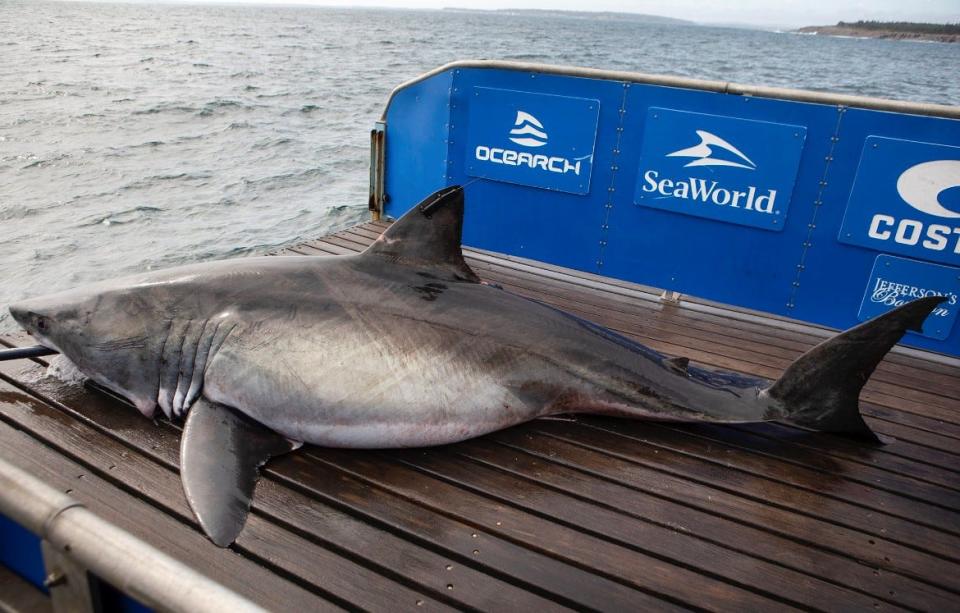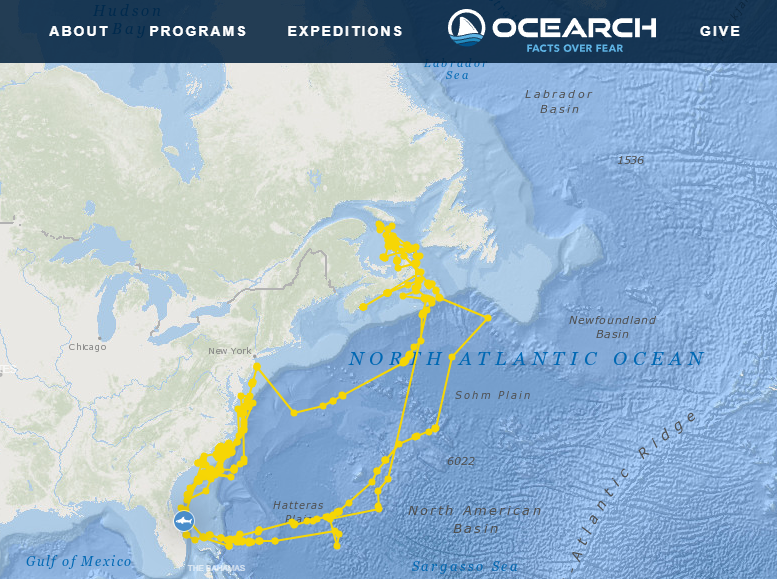Enormous great white shark pings off Cape Canaveral, in time for Delta IV Heavy launch
On the day United Launch Alliance's massive triple-core Delta IV Heavy was set to launch one final time, a jumbo-sized visitor surfaced off the Cape Canaveral coast, a perfect spot to watch the rocket light up the sky.
A nearly 14-foot, 1,700-pound great white shark, nicknamed Mahone by OCEARCH scientists, pinged in the waters northeast of Cape Canaveral at 5:45 a.m. on Thursday, March 28. Mahone was joined a day later by Scot, another behemoth white shark at 1,600 pounds. Scot pinged nearby off the Space Coast.
A ping means the Smart Position and Temperature Transmitting Tag (SPOT) tag attached to the shark's dorsal fin broke the water's surface and transmitted location information to trackers.
Mahone previously pinged off the St. Augustine Beach coast on Leap Day. The shark was tagged by OCEARCH researchers in 2020 and has traveled 18,137 miles since but, according to his tracker, only visited Florida once before, traveling as far south as the Canaveral National Seashore in March 2022.
Here's what to know about white shark Mahone, OCEARCH and sharks in Florida:
More on OCEARCH white shark Mahone

Mahone was tagged off Lunenburg, Nova Scotia on Oct. 1, 2020.
At the time, he was classified as a mature adult male, measured 13 feet, 7 inches long and weighed 1,701 pounds.
He is the largest shark tagged by OCEARCH in Canadian waters and was named after nearby Mahone Bay.
What is OCEARCH?
OCEARCH is a nonprofit research organization studying the ocean's giants.
The group studies great white sharks and other keystone species essential for the health of the oceans.
OCEARCH is launching its 47th expedition on April 1. It departs from Jacksonville, Florida and is scheduled to make its final docking in Charleston, South Carolina on April 21.
During expeditions, researchers have collected previously unattainable data on the animals' migrations, reproductive cycle, genetic status, diet, abundance, and more.
During the expeditions, researchers collected previously unattainable data on the animals' migrations, reproductive cycle, genetic status, diet, abundance, and more.
"If we lose the apex predator (sharks) then we lose all our fish and then there are no fish sandwiches for our grandchildren," OCEARCH founder Chris Fischer told USA TODAY Network's The Courier-Journal. "That's oversimplified, of course, but the idea is important because many shark species are threatened by overfishing and a demand for shark fins in Asia. Their dwindling numbers jeopardize ocean habitats."
What is the OCEARCH shark tracker? One shark 'drew' shark portrait
OCEARCH provides an online map tracking the tagged shark's travels.
Each animal has a Smart Position and Temperature Transmitting Tag (SPOT) tag attached to its dorsal fin which emits a ping when it breaks the water's surface for a short time and transmits location information to trackers.
The most notable tracker page belongs to a 13-foot 3-inch white shark nicknamed Breton. The 1,437-pound shark's pings from September 2020 to January 2022 connect to show what appears to be the outline of a colossal shark, with the tail in Nova Scotia, the body spanning the East Coast and the head pointing at Florida's east coast.

How many sharks has OCEARCH tagged?
According to its tracker, OCEARCH has tagged 371 sharks, including 123 great white sharks.
123 great white sharks
144 tiger sharks
9 blacktip sharks
29 shortfin mako sharks
25 blue sharks
18 hammerhead sharks
6 silky sharks
6 bull sharks
8 whale sharks
3 great hammerhead sharks
The group has also tagged alligators, dolphins, seals, swordfish and turtles.
Great white shark facts
Here are some things to know about white sharks, according to NOAA Fisheries:
White sharks grow slowly. Males mature at around 26 years old and females at around 33 years old. Life expectancy is difficult to determine but is estimated to be between 30 and 70 years.
White sharks are about 4 feet long at birth but can grow up to about 20 feet long and weigh over 4,000 pounds.
White sharks eat an opportunistic diet of fish, invertebrates and marine mammals.
White sharks are partially warm-blooded and can maintain their internal body temperature above that of the surrounding water. This allows them to be more active in cooler waters than cold-blooded species.
Great white sharks in Florida
Great white sharks migrate south when the water gets cold and food sources become scarce up north, according to OCEARCH chief scientist Dr. Bob Hueter.
Think of them as the snowbirds of sharks.
Most of them tend to stay away from the beaches in continental shelf waters, Hueter said.
Most shark attacks happen in Florida
There were 69 documented unprovoked shark attacks around the globe in 2023. The U.S. led the world with 36 attacks and Florida again was the state with the most bites at 16.
Florida shark attacks by county:
Miami-Dade County: 1
Pinellas County: 1
While the U.S. has the most attacks, South Africa has the most shark-related fatalities.
In the past 47 years, there have been 1,230 shark bites worldwide, according to data from floridapanhandle.com, with great white sharks credited as the top biters. No white shark has been identified in a Florida shark bite from 1926 to present, according to Shark Attack File.
Support local journalism by subscribing to a Florida news organization.
This article originally appeared on Fort Myers News-Press: 1,700-pound great white shark pings off Cape Canaveral, Florida coast

